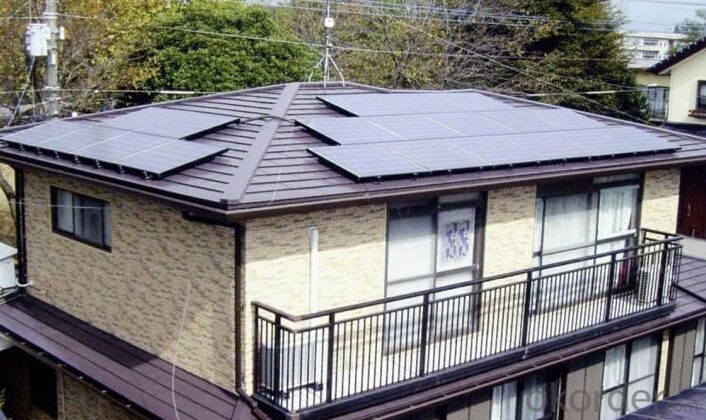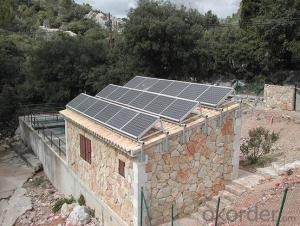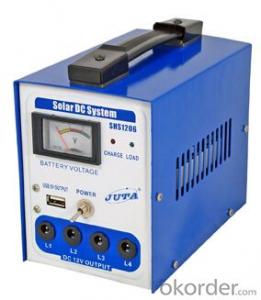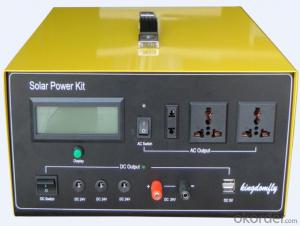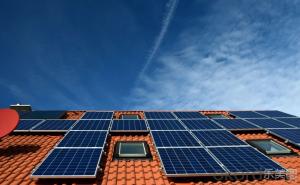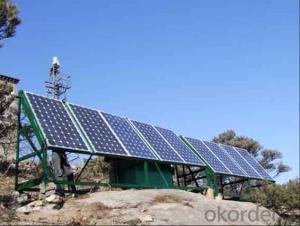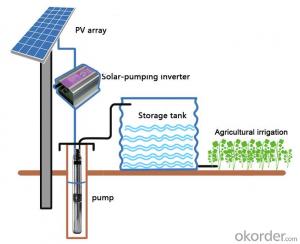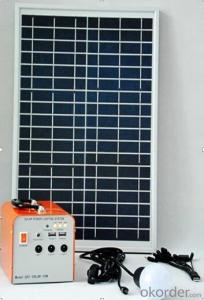Ay Yildiz Solar Energy Systems - 10kW Solar System
- Loading Port:
- China Main Port
- Payment Terms:
- TT or LC
- Min Order Qty:
- -
- Supply Capability:
- -
OKorder Service Pledge
Quality Product, Order Online Tracking, Timely Delivery
OKorder Financial Service
Credit Rating, Credit Services, Credit Purchasing
You Might Also Like
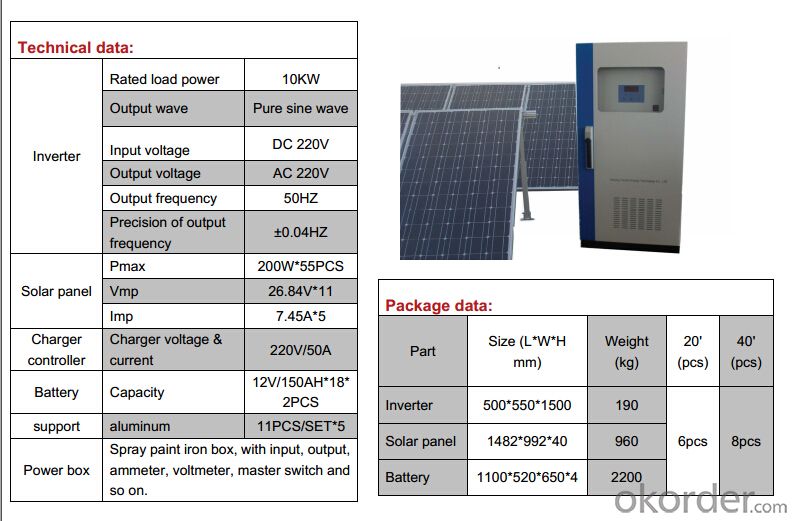
- Q: How do solar energy systems handle excess energy production?
- Solar energy systems handle excess energy production in a few different ways. One common method is through net metering, where any excess energy that is produced by the solar system is fed back into the grid. This excess energy is then credited to the homeowner's account, effectively spinning their meter backward and reducing their energy bill. Another way to handle excess energy production is through the use of battery storage systems. These systems allow homeowners or businesses to store the excess energy generated by their solar panels for use during times of high energy demand or when the sun is not shining. The stored energy can be used during the evening or on cloudy days, maximizing the value and efficiency of the solar system. Additionally, some solar energy systems are designed to automatically shut down or reduce their output when excess energy is being produced. This is known as curtailment and is often used in large-scale solar farms or utility-scale installations. By reducing the output, the excess energy is not wasted and can be more effectively managed and distributed. Overall, solar energy systems have various mechanisms in place to handle excess energy production, whether it be through net metering, battery storage, or curtailment. These methods ensure that the surplus energy is not wasted and can be effectively utilized, making solar energy a highly efficient and sustainable source of power.
- Q: How do solar energy systems impact the electricity grid?
- Solar energy systems impact the electricity grid by reducing the demand for electricity from traditional power plants and lowering overall electricity costs. They also contribute to a more resilient and decentralized grid by generating electricity closer to where it is consumed, reducing transmission losses and enhancing grid stability. However, the intermittent nature of solar power can pose challenges for grid operators in terms of managing fluctuations in supply and demand.
- Q: How does the efficiency of solar panels vary across different panel technologies?
- The efficiency of solar panels can vary significantly across different panel technologies. There are several types of solar panels available in the market, each with its unique characteristics and efficiency levels. Firstly, monocrystalline solar panels are known for their high efficiency. These panels are made from a single crystal structure, resulting in a uniform appearance. Monocrystalline panels have the highest efficiency rates, typically ranging from 15% to 22%. The uniform crystal structure allows for better electron flow, maximizing the conversion of sunlight into electricity. On the other hand, polycrystalline solar panels have a lower efficiency compared to monocrystalline panels. These panels are made from multiple silicon crystals, which creates a less uniform appearance. Polycrystalline panels generally have an efficiency range of 13% to 16%. The presence of multiple crystals can cause electron flow to be less efficient, resulting in a slightly lower conversion rate. Another type of solar panel technology is thin-film panels. Thin-film solar panels are made by depositing thin layers of photovoltaic material onto a substrate. These panels have the lowest efficiency rates among the different technologies, typically ranging from 10% to 12%. However, thin-film panels have the advantage of being lightweight, flexible, and less expensive to produce, making them suitable for certain applications where efficiency is not the primary concern. Furthermore, there are emerging technologies like bifacial solar panels and multi-junction solar cells. Bifacial panels have the ability to capture sunlight from both sides, increasing their overall efficiency. Multi-junction solar cells use multiple layers of semiconductors to capture a broader spectrum of light, enabling higher efficiency levels. In summary, the efficiency of solar panels varies across different panel technologies. Monocrystalline panels offer the highest efficiency, followed by polycrystalline panels and thin-film panels. However, it's important to consider other factors such as cost, space availability, and specific application requirements when choosing the most suitable solar panel technology.
- Q: Can solar energy systems generate enough electricity to power a home?
- Yes, solar energy systems can generate enough electricity to power a home. The amount of electricity produced by a solar energy system depends on various factors such as the size and efficiency of the system, the geographical location, weather conditions, and the energy consumption patterns of the household. In general, a well-designed and properly installed solar energy system can generate enough electricity to power a typical home. The system consists of solar panels that capture sunlight and convert it into electricity through the photovoltaic effect. This electricity can be used to meet the energy needs of a home, including powering appliances, lights, heating and cooling systems, and other electrical devices. To ensure sufficient electricity production, it is important to consider the energy requirements of the home and design a solar system accordingly. This includes determining the appropriate number and size of solar panels, as well as incorporating energy storage solutions such as batteries to store excess electricity for use during cloudy days or at night. Moreover, advancements in solar technology, such as high-efficiency solar panels and smart inverters, have significantly improved the energy output of solar systems. Additionally, net metering programs in many areas allow homeowners to sell excess electricity back to the grid, further enhancing the economic viability of solar energy systems. While solar energy systems can generate enough electricity to power a home, it is crucial to assess the specific circumstances of each home to determine the feasibility and efficiency of installing such a system. Consulting with a reputable solar energy provider and conducting a thorough assessment will help homeowners make informed decisions about harnessing solar power for their homes.
- Q: Can a solar energy system be used to power agricultural operations?
- Yes, a solar energy system can be used to power agricultural operations. Solar energy systems, such as solar panels, can generate electricity by converting sunlight into usable energy. This electricity can be utilized to power various agricultural operations, such as irrigation systems, water pumps, machinery, and lighting. Solar-powered irrigation systems are particularly beneficial for agricultural operations as they can provide a reliable and sustainable source of energy for watering crops. These systems can be designed to automatically turn on and off based on sunlight availability, ensuring that crops receive the necessary amount of water. Solar-powered water pumps can also be used to extract water from wells or other water sources, reducing the reliance on fossil fuels and minimizing operational costs. Additionally, solar energy can be used to power machinery and equipment used in agricultural operations. This includes tractors, harvesters, and other farm equipment, reducing the dependency on fossil fuels and lowering carbon emissions. Solar-powered lighting can also be installed in agricultural facilities, such as barns or storage areas, providing illumination without the need for grid electricity. In regions with abundant sunlight, solar energy systems can be a cost-effective and sustainable solution for powering agricultural operations. They offer numerous benefits, including reduced operational costs, decreased carbon footprint, and increased energy independence.
- Q: Can solar energy systems be used for space heating?
- Yes, solar energy systems can be used for space heating. Solar thermal systems can be designed to capture and convert sunlight into heat energy, which can then be used to warm indoor spaces. This can be achieved through the use of solar collectors and heat transfer mechanisms, making solar energy a viable option for space heating purposes.
- Q: Can solar energy systems be used for powering electric vehicle solar charging garages?
- Certainly, electric vehicle (EV) solar charging garages can indeed utilize solar energy systems. In reality, incorporating solar power into these garages presents a remarkable opportunity to endorse sustainability and diminish carbon emissions. Sunlight can be harnessed and transformed into electricity by installing solar panels on the garage roof or nearby. Consequently, this electricity can be employed to operate the charging stations, delivering clean and renewable energy for EVs. By integrating solar energy systems into charging garages, it becomes feasible to establish a self-sufficient and eco-friendly ecosystem for EV owners.
- Q: What are the economic benefits of using solar energy systems?
- The economic benefits of using solar energy systems include reduced energy costs, long-term savings, job creation, and increased local investment. Solar energy systems can significantly lower electricity bills by generating electricity from the sun, reducing reliance on traditional energy sources. Additionally, the long lifespan of solar panels allows for long-term savings as they require minimal maintenance and have no fuel costs. The growing demand for solar energy also creates new job opportunities in the installation, manufacturing, and maintenance sectors. Moreover, investing in solar energy systems stimulates local economies by keeping energy spending within the community and reducing reliance on imported energy sources. Overall, the economic benefits of using solar energy systems contribute to sustainability, cost-effectiveness, and the growth of green industries.
- Q: How does a solar energy system convert sunlight into electricity?
- Through a process known as the photovoltaic effect, sunlight is transformed into electricity by a solar energy system. This effect takes place within solar panels, which are composed of numerous silicon cells. When sunlight makes contact with the solar panels, it is assimilated by the silicon cells, which act as semiconductors. The energy derived from the sunlight stimulates the electrons within the silicon atoms, causing them to detach from their atomic bonds and generate an electric current. This electric current adopts the form of direct current (DC), which is not suitable for most household appliances. Consequently, an inverter is employed to convert the DC electricity into alternating current (AC), the standard type of electricity utilized in homes and businesses. The AC electricity produced by the solar energy system can subsequently be utilized to power various appliances and devices within a building. Should the system generate an excess of electricity beyond current usage, it can be stored in batteries for future usage or returned to the grid through a process known as net metering. To summarize, the conversion of sunlight into electricity is achieved by solar energy systems utilizing solar panels to assimilate sunlight and generate an electric current through the photovoltaic effect. This current is subsequently converted from DC to AC and can be utilized to power buildings or stored for future use.
- Q: Can solar energy systems be used for powering off-grid eco-villages?
- Yes, solar energy systems can certainly be used to power off-grid eco-villages. Solar panels can generate electricity from the sun's energy, which can then be stored in batteries for later use. This renewable and clean source of energy is ideal for eco-villages that prioritize sustainability and reducing their carbon footprint. With advancements in technology, solar energy systems have become more efficient and affordable, making them a viable option for powering off-grid communities.
Send your message to us
Ay Yildiz Solar Energy Systems - 10kW Solar System
- Loading Port:
- China Main Port
- Payment Terms:
- TT or LC
- Min Order Qty:
- -
- Supply Capability:
- -
OKorder Service Pledge
Quality Product, Order Online Tracking, Timely Delivery
OKorder Financial Service
Credit Rating, Credit Services, Credit Purchasing
Similar products
Hot products
Hot Searches
Related keywords

